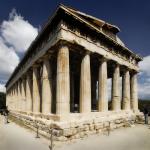|
This section contains 350 words (approx. 2 pages at 300 words per page) |

|
Aleman and Others. Lyric or sung poetry (the term does not include epic, which was not sung in the historical period at least) goes back well beyond the earliest records of the Greek world. Already Homer mentions choral song several times, and the occasions to which he ascribes these, such as funerals and weddings, continued to provide major opportunities for the formal performance of song in more literate ages. Perhaps the first lyric poet the reader can name is Alcman, a Spartan of the seventh century B.C.E., whose fragmentary work contains several Partheneia, or songs for choruses of maidens. Around the end of that century lived Sappho and Alcaeus on Lesbos, but their work was chiefly monodic rather than choral. The spread of Hellenism also produced contemporary lyric in the West: Stesichorus worked in Himera and composed a famous Palinode, or retraction-song, in...
|
This section contains 350 words (approx. 2 pages at 300 words per page) |

|




